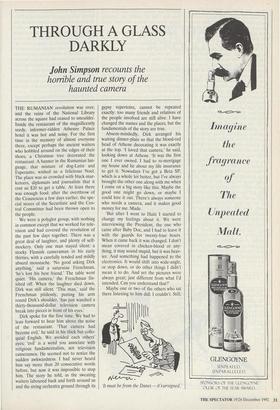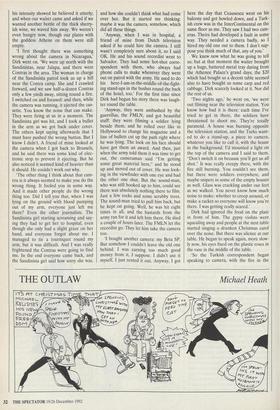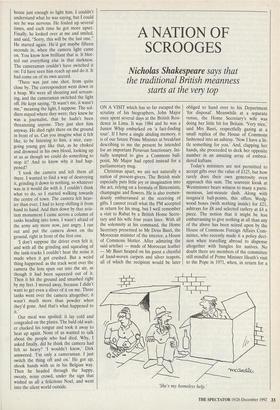THROUGH A GLASS DARKLY
John Simpson recounts the horrible and true story of the haunted camera
THE RUMANIAN revolution was over, and the ruins of the National Library across the square had ceased to smoulder. Inside the restaurant of the magnificently seedy, informer-ridden Athenee Palace hotel it was hot and noisy. For the first time in the memory of almost everyone there, except perhaps the ancient waiters who hobbled around on the edges of their shoes, a Christmas tree decorated the restaurant. A banner in the Rumanian lan- guage, that mixture of dog-Latin and Esperanto, wished us a felicitous Noel. The place was so crowded with black-mar- keteers, diplomats and journalists that it cost us $20 to get a table. At least there was enough food: after the overthrow of the Ceausescus a few days earlier, the spe- cial stores of the Securitate and the Cen- tral Committee had been thrown open to the people.
We were a polyglot group, with nothing in common except that we worked for tele- vision and had covered the revolution of the past few days together. There was a great deal of laughter, and plenty of self- mockery. Only one man stayed silent: a stocky Flemish cameraman in his early thirties, with a carefully tended and mildly absurd moustache. 'No good asking Dirk anything,' said a saturnine Frenchman, 'he's lost his best friend.' The table went quiet. 'His camera,' the Frenchman fin- ished off. When the laughter died down, Dirk was still silent. 'This man,' said the Frenchman pitilessly, putting his arm round Dirk's shoulder, 'has just watched a thirty-thousand-dollar television camera break into pieces in front of his eyes.'
Dirk spoke for the first time. We had to lean forward to hear him above the noise of the restaurant. 'That camera had become evil,' he said in his thick but collo- quial English. We avoided each others' eyes; 'evil' is a word you associate with religious fundamentalists, not television cameramen. He seemed not to notice the sudden awkwardness. I had never heard him say more than 20 consecutive words before, but now it was impossible to stop him. The story he told, as the sweating waiters laboured back and forth around us and the string orchestra ground through its gypsy repertoire, cannot be repeated exactly: too many friends and relatives of the people involved are still alive. I have changed the names and the places, but the fundamentals of the story are true.
Absent-mindedly, Dirk arranged his waiting dinner-plate so that the blood-red head of Athene decorating it was exactly at the top. 'I loved that camera,' he said, looking down at Athene. 'It was the first one I ever owned. I had to re-mortgage my house and lie about my life insurance to get it. Nowadays I've got a Beta SP, which is a whole lot better, but I've always brought the other one along with me when I come on a big story like this. Maybe the good one might go down, or maybe I could hire it out. There's always someone who needs a camera, and it makes good money for me. Made.
'But after I went to Haiti I started to change my feelings about it. We were interviewing the President, the one who came after Baby Doc, and I had to leave it with the guards for twenty-four hours. When it came back it was changed. I don't mean covered in chicken-blood or any- thing; it may sound stupid, but it was heav- ier. And something had happened to the electronics. It would shift into wide-angle, or stop down, or do other things I didn't mean it to do. And yet the pictures were always great; just different from what I'd intended. Can you understand that?'
Maybe one or two of the others who sat there listening to him did; I couldn't. Still, 'It must be frotn the Danes —iesunsigned.' his intensity showed he believed it utterly; and when our waiter came and asked if we wanted another bottle of the thick sherry- ish wine, we waved him away. We weren't even hungry now, though our plates with the goddess Athene on them were still empty.
'I first thought there was something wrong about the camera in Nicaragua,' Dirk went on. 'We were up north with the Sandinistas, near Jalapa, and there were Contras in the area. The woman in charge of the Sandinista patrol took us up a hill near the Contra camp. She and I crawled forward, and we saw half-a-dozen Contras only a few yards away, sitting round a fire. I switched on and focused: and then, while the camera was running, it ejected the cas- sette. You know the noise that can make. They were firing at us in a moment. The Sandinista girl was hit, and I took a bullet in the arm as we got back under cover. The others kept saying afterwards that I must have pushed the wrong button. But I know I didn't. A friend of mine looked at the camera when I got back to Brussels, and he said there was some kind of elec- tronic stop to prevent it ejecting. But he also noticed it seemed kind of heavier than it should. He couldn't work out why.
'The other thing I think about that cam- era is it always seemed to make you do the wrong thing. It fooled you in some way. And it made other people do the wrong thing too. Did I tell you that, when I was lying on the ground with blood pumping out of my arm, everyone just left me there? Even the other journalists. The Sandinista girl starting screaming and say- ing they had to get her to hospital, even though she only had a slight graze on her hand, and everyone forgot about me. I managed to tie a tourniquet round my arm, but it was difficult. And I was really frightened the Contras were going to find me. In the end everyone came back, and the Sandinista girl said how sorry she was, and how she couldn't think what had come over her. But it started me thinking: maybe it was the camera, somehow, which did all these things.
'Anyway, when I was in hospital, a friend of mine from Dutch television asked if he could hire the camera. I still wasn't completely sure about it, so I said OK. He and his sound recordist went to Salvador. They had some hot-shot corre- spondent with them, who always had phone calls to make whenever they went out on patrol with the army. He used to do his here-I-am-in-the-middle-of-the-fight- ing stand-ups in the bushes round the back of the hotel, too.' For the first time since Dirk had begun his story there was laugh- ter round the table.
'Anyway, they were ambushed by the guerrillas, the FMLN, and got beautiful stuff: they were filming a soldier lying beside them, and he rolled over like in Hollywood to change his magazine and a line of bullets cut up the path right where he was lying. The look on his face should have got them an award. And then, just when the army told them it was time to get out, the cameraman said "I'm getting some great material here," and he stood up and moved out of cover. He was look- ing in the viewfinder with one eye and had the other one shut. But the sound-man, who was still hooked up to him, could see there was absolutely nothing there to film. Just a few rocks and some scrubby trees. The sound-man tried to pull him back, but he kept on going. Well, he was hit eight times in all, and the bastards from the army ran for it and left him there. He died a couple of hours later. The FMLN let the recordist go. They let him take the camera too.
'I bought another camera: my Beta SP. But somehow I couldn't leave the old one behind. I was earning too much good money from it, I suppose. I didn't use it myself, I just rented it out. Anyway, I got here the day that Ceausescu went on his balcony and got howled down, and a Turk- ish crew was in the InterContinental on the same floor as me. They saw I had two cam- eras. Theirs had developed a fault in some way. They needed a camera badly, so I hired my old one out to them. I don't sup- pose you think much of that, any of you.'
We knew now what he was going to tell us; but at that moment the waiter brought up a huge, battered metal tray dating from the Athenee Palace's grand days; the $20 which had bought us a decent table seemed also to have bought us some carp and red cabbage. Dirk scarcely looked at it. Nor did the rest of us.
Two nights ago,' he went on, 'we were out filming near the television station. You know how bad it is there: each time I've tried to get in there, the soldiers have threatened to shoot me. They're totally paranoid. A house was burning opposite the television station, and the Turks want- ed to do a stand-up, a piece to camera, whatever you like to call it, with the house in the background. I'd mounted a light on the top of the camera and I said to them, "Don't switch it on because you'll get us all shot." It was really creepy there, with the fire still burning. You couldn't see them, but there were soldiers everywhere, and maybe snipers in some of the empty houses as well. Glass was crackling under our feet as we walked. You never know how much noise to make: whether to creep around, or make a racket so everyone will know you're there. I was getting really scared.'
Dirk had ignored the food on the plate in front of him. The gypsy violins were squealing away and people at the next table started singing a drunken Christmas carol over the noise. But there was silence at our table. He began to speak again, more slow- ly now, his eyes fixed on the plastic roses in the vase in the middle of the table.
'So the Turkish correspondent began speaking to camera, with the fire in the house just enough to light him. I couldn't understand what he was saying, but I could see he was nervous. He fouled up several times, and each time he got more upset. Finally, he looked over at me and smiled, and said, "Sorry, this will be the last one." He started again. He'd got maybe fifteen seconds in, when the camera light came on. You know how brilliant that is. It blot- ted out everything else in that darkness. The cameraman couldn't have switched it on: I'd have seen him reach up and do it. It had come on of its own accord.
'There was just one shot, from quite close by. The correspondent went down in a heap. We were all shouting and scream- ing, and the cameraman switched the light off. He kept saying, "It wasn't me, it wasn't me," meaning the light, I suppose. The sol- diers stayed where they were; they knew he was a journalist, that he hadn't been threatening anyone. They just shot him anyway. He died right there on the ground in front of us. Can you imagine what it felt like, to be listening to him, a nice, easy- going young guy like that, as he choked and drowned in his own blood, looking up at us as though we could do something to stop it? And to know why it had hap- pened?
'I took the camera and left them all there. I wanted to find a way of destroying it, grinding it down to nothing, so whatever was in it would die with it. I couldn't think what to do, so I started walking towards the centre of town. The camera felt heav- ier than ever; I had to keep shifting it from hand to hand. And then down by that avia- tio'n monument I came across a column of tanks heading into town. I wasn't afraid of the army any more now, just angry. I ran out and put the camera down on the ground, right in front of the first one. 'I don't suppose the driver even felt it, and with all the grinding and squealing of the tank-tracks I couldn't hear the noise it made when it got crushed. But a weird thing happened: as the track went over the camera the lens spun out into the air, as though it had been squeezed out of it. Then it hit the ground and smashed right by my feet. I moved away, because I didn't want to get even a sliver of it on me. Three tanks went over the camera altogether; it wasn't much more than powder when they'd gone. And that's what happened to it.'
Our meal was spoiled: it lay cold and congealed on the plates. The bald old wait- er clucked his tongue and took it away to heat up again. None of us wanted to talk about the people who had died. Why, I asked finally, did he think the camera had felt so heavy? 'I wouldn't know,' Dirk answered. 'I'm only a cameraman. I just switch the thing off and on.' He got up, shook hands with us in his Belgian way. Then he headed through the happy, sweaty, noisy crowd, under the sign that wished us all a felicitous Noel, and went into the silent world outside.












































































































 Previous page
Previous page